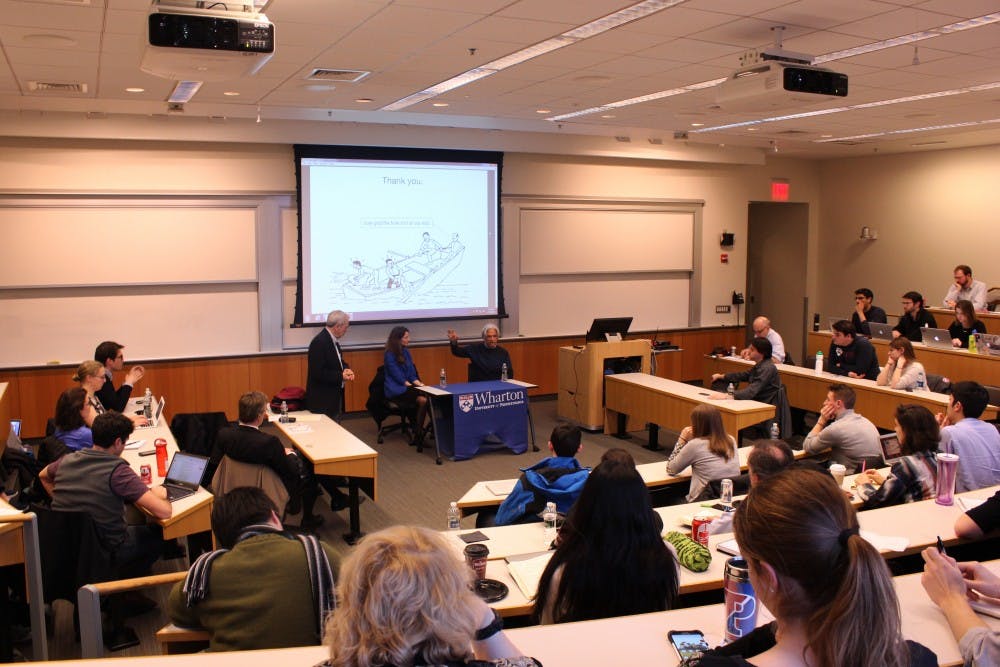
Dale Jamieson’s books have taken on climate change deniers and philosophical critics of structuralism, but he is no match for the classroom audio-visual technology of Wharton Computing.
After a little bit of technical assistance, the New York University environmental ethicist gave a well-attended lecture about the 2015 Paris Agreement on global greenhouse gas emissions Tuesday afternoon with his colleague Jennifer Jacquet. The lecture, titled “Living with Climate Change: Will Paris Make a Difference?” focused on the practicalities of enforcing the historic but controversial international agreement worldwide.
The talk is the first in this semester’s Risk Regulation Seminar Series, a joint effort between the Penn Program on Regulation at Penn Law and the Wharton Risk Management and Decision Processes Center. The audience, which filled the Huntsman Hall classroom, included local environmental professionals as well as Penn undergraduate, MBA and law students.
Jamieson was introduced by Wharton Risk Management and Decision Processes Center Co-Director Howard Kunreuther, who has worked with Jamieson in the past.
“I always felt coming out of that that there was a new way of thinking about problems that I wouldn’t have come across had I not interacted with Dale,” Kunreuther said in his remarks.
The Paris Agreement was drafted during the 2015 United Nations Climate Change Conference in December. The agreement is designed to limit global warming to less than two degrees Celsius compared to pre-industrial years.
While its wording has been finalized by consensus among the 195 signatories to the United Nations Framework Convention on Climate Change, the Paris Agreement will not be binding under international law until it has been ratified by at least 55 UNFCCC signatories, who collectively produce at least 55 percent of global greenhouse gas emissions.
But both the process of making the agreement legally binding and the subsequent steps of meeting its climate policy goals will prove challenging in the coming months.
“There’s going to have to be both a ratcheting up of ambition and a keeping of existing obligations,” Jamieson said during the presentation.
He also warned the audience against trusting too much in climate change diagrams that frequently show the rate at which the planet’s temperature is increasing. Although not necessarily wrong, these charts represent what experts think might happen, rather than what precisely will happen. Oftentimes, the statistics are rough estimates at best, Jamieson said.
“So when you see charts like this,” he added, “don’t believe them.”
Throughout the talk, Jamieson and Jacquet distinguished between the regulatory regimes of past international climate agreements and those created under the Paris Agreement. While previous agreements adopted a top-down approach that dictated sanctions and punishments, the Paris Agreement uses a bottom-up approach, encouraging member-countries to develop their own plans to reach the Paris Agreement’s goals.
Jacquet called the Paris Agreement’s enforcement mechanism “name and shame,” with stigma serving to keep participating nations accountable to the promises outlined in the agreement.
“Stigma is maximized at very high or very low involvement,” Jacquet said. “We see shaming at work regularly in civil society.”
She cited numerous examples of the media and non-profit organizations tracking the progress of other organizations that have signed or voiced support for past international environmental agreements, including lists showing how quickly countries released accurate data about their carbon emissions.
“They were singling out countries that didn’t live up to their commitments or what people thought should be their commitments,” Jacquet said.
Jacquet believes that the Paris Agreement works because rather than relying on harsh consequences for countries that fall short, the agreement creates a system where enforcement is driven by governments’ desire to avoid shame. Therefore countries that choose to sign the Paris Agreement will live up to its expectations in order to avoid being singled out.
In other words, she said, peer pressure to look good in the international community would keep countries on track.
Jacquet and Jamieson ended their presentation by saying that the Paris Agreement is just the beginning of a long process. Rather than leading directly to dramatic action on climate change, its chief legacy will be having facilitated future legal and political discussions on the issue.
“If Paris succeeds, it will not be so much because of the text but of the context,” Jamieson said.
The Daily Pennsylvanian is an independent, student-run newspaper. Please consider making a donation to support the coverage that shapes the University. Your generosity ensures a future of strong journalism at Penn.
DonatePlease note All comments are eligible for publication in The Daily Pennsylvanian.





